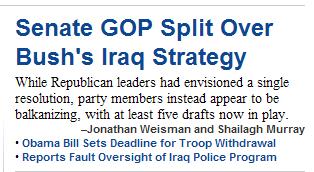I’ve been reflecting on the reaction to yesterday’s “Unspeakable Truth” post, about America’s self-destructive reaction to the September 11 attacks. The post began by quoting historian David Bell, who argued that Islamic terrorism, although certainly very dangerous, is not an existential threat to America. (It is unfortunate that the article was published under an inflammatory headline, “Was 9/11 really that bad?†Most of the right-wing reaction to the article didn’t get past the headline, which very likely was written by some dweeb on the Los Angeles Times copydesk and not Bell himself.)
I also quoted James Fallows’s “Declaring Victory” article from the September 2006 Atlantic Monthly, which I’m very sorry is available only to subscribers. However, I have blogged about this article here, here, and here, here, and probably elsewhere. In this article Fallows interviews a number of national security experts for their assessment of where the U.S. stands in its counterterrorism efforts. Shortly after this issue of Atlantic Monthly came out, parts of a National Intelligence Estimate of April 2006 were declassified and released, and as I noted here, Fallows’s experts and the NIE came to pretty much the same conclusions.
Among other things, the NIE and the Fallows experts agreed that the war in Iraq is growing the threat of terrorism against the United States, not reducing it. Very briefly, Bush’s Folly is not only increasing the number of Islamic hotheads who want to strike America; it is also diverting many national security resources that could be put to better use elsewhere.
The Fallows experts discuss a number of actions the U.S. should be doing but isn’t, as well as action the U.S. is doing but shouldn’t. I’m very sorry there’s a subscription wall around the Atlantic Monthly article, but if you go through my old posts linked above you’ll get a pretty good picture of what’s in it.
However, I assure you that nobody — not I, not James Fallows or his interviewees, not the National Intelligence Estimate — recommended doing nothing.
As you may have noticed if you followed yesterday’s “Unspeakable Truth” comments, righties seem to see only two options: thrashing about self-destructively and making the problem worse, or nothing.
It doesn’t matter how carefully one explains and documents reasons why the Bush Administration’s approach to national security is counterproductive. All they comprehend is “Bush’s Way” or “nothing.” Comments to the “Unspeakable Truth” post were typical, such as this one:
I find you lefties amusing. You’d rather wait until there’s a Stalingrad type siege to fight back, maybe. Of course, you’d want to poll ‘the world’s’ opinion for permission first.
Or this one:
Knock Knock.
Who is there?
Jihaddi terrorist.
What can I do for you today?
I am here to hurt your family. But only one of them. I don’t have enough bullets in my gun to kill you all.
Oh that’s fine then. Since my family will continue to exist even with the dead member, then I shouldn’t overreact to your threat.
Or this one:
I think you guys might be right. It got me thinking about how many innocent victims get killed while being mugged or raped because they fought back, or more importantly because the perp didn’t want to leave any witness because of the severity of the punishment if caught. I mean, we are just talking about a couple of bucks or a little bit of your time here people, not an existential threat, is that really worth dying over? If you just gave them what they wanted and then we all just look the other way, how many innocent lives would be saved?
What’s ironic about that last comment is that, essentially, the Bush Administration is giving Osama bin Laden what he wanted. It has been well documented by Richard Clarke and others that for many years Osama bin Laden’s game plan was to provoke the United States into invading a Muslim country. This, he figured, would incite large numbers of Muslims into vowing jihad against the U.S. And it seems he was right.
Effective counterterrorism requires a multifaceted approach, discussed in the old posts linked above; there’s no one, big, splashy, magic-bullet solution. And unfortunately, comprehending the various facets and perceiving how they work together requires an attention span somewhat longer than that of a fruit fly. Hence, righties hear “nothing.”
As a counterweight to the Extremely Stupid, see Lorelei Kelly’s article “What Progressives Have in Common with the Military” in AlterNet. It begins:
When Army Col. Ike Wilson returned home in March 2004 from a 12 month deployment in Iraq, one thought remained with him: “Why such a deliberate plan to fight the war, but none to win the peace to follow?”
Wilson, a West Point professor with years of military planning experience, knew that placing this question at the the center of national security policy discussions was the only way to truly learn from Iraq and Afghanistan. He soon founded the Beyond War Project as a hub to educate both the military and the public about a new vision for war, peace and America’s role in the world. Thus far, he’s signed up participants ranging from Cornell University’s Peace Studies Program to the U.S. Air Force.
Wilson’s approach typifies today’s professional military education, which includes a breadth of topics that might surprise those more familiar with the liberal arts. In contrast to linear Cold War themes like strategic nuclear deterrence, military schools emphasize humanities subjects such as language, international cooperation and world culture. Such lessons arrived in these academic settings in the early part of the decade–though it took the terror attacks of 9/11 and two offensive U.S. military actions before elected leaders really paid attention to the dramatic shift from Cold War thinking.
Today, nearly every general that testifies before Congress claims that the conflicts in Iraq and Afghanistan do not have purely military solutions. This sea change means that many members of the military and progressives are philosophically much closer than either believes and they are both hurt by the lack of meaningful interaction. Understanding and aligning with the military around shared concerns could be a crucial new strategy for the left.
The rightie approach to national security is what I call the “bison herd stampede strategy.” A big herd of terrified, stampeding American bison (buffalo to us old folks) generates huge, destructive force, but it’s got no brain. And the herd is as likely than not to stampede right over a cliff.
The approach described in Ms. Kelly’s article, however, puts thinking ahead of stampeding. I’m not going to excerpt any more of it, because it’s better to read the whole thing.
Thinking about “nothing” reminded me of the Chinese principle of Wu Wei, which is usually translated as “not doing” or “without action.” Wu Wei is often misinterpreted as passivity, but Wu Wei is an important principle in Chinese martial arts, which is a clue that it is not passive at all. There’s a pretty good explanation of this in this article:
True martial arts masters understand wu wei as “spontaneous action” or “effortless flow”. You might know that Bruce Lee founded Jeet Kune Do, a style that, like the man himself, was imbued with an emphasis on speed and power. But you probably didn’t know that he also founded Wu Wei Gung Fu, a fighting art that expressed his ultimate philosophy: “Learn technique. Practice technique. Forget technique.” At the highest level of this discipline (as well as other martial arts), the warrior becomes one with the flow of reality around him. In that state of oneness, he is able to act without the necessity of volition. To the bystanders, he doesn’t seem to do much, and yet he delivers the exact minimum of impact at the exact right time to accomplish what needs to be done and not one iota more.
Not that I was ever a martial arts master — my best sport was croquet, but it’s been years since I’ve played even that — but I understand some basic principles, such as using the energy of your opponent’s momentum to bring him down. The master who uses no more energy than is necessary is harder to defeat than one who is fighting as hard as he can.
This Wikipedia article on Wu Wei isn’t bad; I like this part: “The aim of wu wei is to achieve a state of perfect equilibrium, or alignment with the Tao, and, as a result, obtain an irresistible form of ‘soft and invisible power’ over things (the self, others, a country).” Tao may be a little too mystical for some of you, but the essential point is that it’s best to do just enough; not too much, not too little.
The power of water is a frequent theme in the Tao Teh Ching, such as in #78:
Nothing in the world is softer than water,
Yet nothing is better at overcoming the hard and strong.
The Tao Teh Ching also takes a dim view of hardness and rigidity. This is from #76:
Just as a sapless tree will split and decay
So an inflexible force will meet defeat;
The hard and mighty lie beneath the ground
While the tender and weak dance on the breeze above.
From a Taoist/martial arts perspective, the U.S. has made every possible mistake in the “war on terror.” We’re like the big, dumb, muscle-bound brute that Jackie Chan whips every time. Wu Wei looks like “doing nothing” to some people, but it’s just the “nothing” that needs to be done.
 Molly Ivins died today. From The Fort Worth Star-Telegram :
Molly Ivins died today. From The Fort Worth Star-Telegram :

